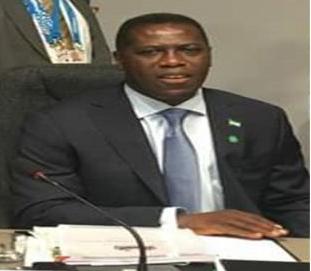The Upcoming Memoirs of The Doyen of Krio Politicians: SAJ Pratt’s Political Legacy!
Following recent press publications that a “soon to be published” memoir of Hon. S.A.J Pratt was imminent, I have since remained cautiously hopeful that just by its publication, one critical disservice by most of Sierra Leone’s politicians to our nation is at last being put to pasture. The paucity of the memoir genre in the political history of the country reflects poorly on the political elite, whose penchant for unaccountability only partly explains this status quo. The failure by political leaders and elites generally to provide a written accounting to the citizens and posterity, of the reasons and meaning for political events and decisions undertaken on their behalf, has been a long standing vexing concern among political scientists, commentators and historians in understanding the political culture and practice of our country. (Photo: Kortor Kamara, Author)
As a piece of autobiographical writing, a memoir generally embraces the full breadth of the writer’s career and relevant national events that require contemplation, reflection and meaning. Thus, the publication of the memoirs of a politician once dubbed by the celebrated historian, Christopher Fyfe as “the doyen of Krio politicians”; a learned technocrat and leading politician with service to our country spanning over decades, both nationally and internationally cannot be more timely in bringing about some perspective and meaning to most of the decisions of both the SLPP, under whom he served as a senior economic policy adviser and the APC administration under which he served in senior cabinet positions.
For our nation is only placed in a position of learning and understanding, both the positive and negative aspects from the past, with a view of forestalling and preventing repetition of prior mistakes; when the decision makers or parties privy to the decision making process objectively critique their decisions and those of their contemporaries through such written media as the political memoir.
As a student of Sierra Leone politics and history from an early age, one memoir of a Sierra Leone politician that I have always yearned to read is that of Mr. S.A.J Pratt, whose political experiences spanning the period from independence, the SLLP administrations of both Sir Milton Margai and Sir Albert Margai and the prominent ministerial positions and roles played by him in the APC administration of President Siaka Stevens, must help elucidate on decisions and events that have largely shaped the development, or lack thereof of our nation.
Memoirs by President Tejan-Kabbah and other members of the erstwhile SLPP government, especially Dr. Sama Banya, who also served in high cabinet positions under both the APC and SLPP and former vice-president, Solomon Berewa would also greatly help in shedding scholarship on some of the nation’s recent history, economic strategies and the civil war period. Political and historical scholarship, that by and large continues to remain largely in the domain of newspaper articles, mostly devoid of analytical depth and contributions by the major participants. These politicians would be providing our nation an invaluable service by penning memoirs of their experiences in government, how and why monumental policy decisions were made during the civil war and subsequent decisions pertaining to events surrounding the path of development, executions of people perceived as collaborators, implementation of various peace accords and the decision relative to the arrest of Chief Hinga Norman, among just a few.
Political discourse among Sierra Leone’s active and retired political elite has remained relatively barren as participants have remained largely mute in discussing and publishing policy positions, while running for offices and memoirs of their experiences in government, after they leave or retire from politics. The written historical accounts of our political leaders’ participation in major socio-economic and political events have thus largely remained non-existent.
The absence of archival records into how, who and why in governmental deliberations and policy formulation by governance institutions, especially as relates to the presidency and executive arm of government, remains a cause for grave concern. For example, since independence there has existed a cabinet secretariat, which even with the change in administrations stubbornly refuses to divulge the participation of our highest political leaders in decisions that have shaped the country. A legal mechanism, such as the proposed Freedom of Information Act, being currently lobbied by civil society groups in Sierra Leone will help ease such constraints both on intellectual discourse of policy decisions and or a reassessment of historical decisions.
One such historical decision that I hope the S.A.J Pratt memoir can shed a greater light on is the decision by the Siaka Stevens government to close the railway system in Sierra Leone by 1974. A national railway system, which initially started operations in 1897, at the time the first in British West Africa, that by 1907 had traversed through Waterloo into the hinterland of Songo, Rotifunk, Bo, Baiima, Kenema and down to the eastern most reaches of Pendembu. This railway network which by 1914 had reached Makeni and subsequently Kamabai was rather brought to an ignoramus closing, not only by having the company ceasing operations, but with all railway tracks being uprooted throughout the entire 311 mile stretch, remains one of Sierra Leone’s dumbest political decisions for which no politician has adequately explained their role to the people and or taken responsibility.
As a former general manager of the Sierra Leone Railways, Minister Pratt’s policy positions on the closing and sale of the locomotives, coaches, rail tracks and property of the railways during the Siaka Stevens regime will be highly anticipated. What national policy reasons were adduced by the proponents of such a proposal that to all intents and purposes must be seen now, even by the original proponents, as a major catalyst for Sierra Leone’s underdevelopment? Some have even postulated that the absence of the railways greatly inhibited the government’s response to the RUF rebel attacks and the resultant prolongation of the war. Glaringly, the demise of productive commerce in the country can be attributed largely to the closing of the only reliable transportation network in the country, resulting in our transformation of producers and exporters of various agricultural commodities into a nation of importers of even our staple food, rice.
Another area of keen review will be the establishment of the one-party state and the driving force behind such mass disenfranchisement of political dissent in the country during the 1978 to 2001 period. This period also saw the rampant “cross-carpeting” from the opposition to the APC, as is again being manifested, through coercive and other unconstitutional measures culminating into opposition party leaders nearly all assuming positions in the APC government.
Does he sense any similarity in the reported push by the new-APC to absorb opposition political parties and thus ultimately weaken and establish a new one-party state? What lessons can be learnt from the above two political currents of which he was confronted while a senior cabinet member in all of Siaka Stevens APC administrations from 1968 through his retirement from elective office. Aside of the principle of collective responsibility for cabinet decisions, it would be worthy to have Mr. Pratt’s take on the debates and protagonists that shaped our nation’s
Finally, as the memoir of Professor S.A.J Pratt is slated to be released, we wish to encourage other historical political figures privy to decision making processes on behalf of our nation since independence, to avail of themselves the written memoir genre to explain, reflect on and offer perspectives of their participation in events that for good or ill has shaped the course of our history. The archives of socio-political and economic policy decisions by successive governments, especially in the cabinet secretariat and in ministries, departments and agencies (MDA) must be made available to scholars so posterity can learn from mistakes and accurately apportion responsibilities.
The author, Mr. Kortor Kamara is a United States based Sierra Leone socio-economic and political commentator whose writings on contemporary Sierra Leone politics and development issues have been published by several publications both internationally and in his native Sierra Leone.Stay with Sierra Express Media, for your trusted place in news!
© 2010, https:. All rights reserved.






